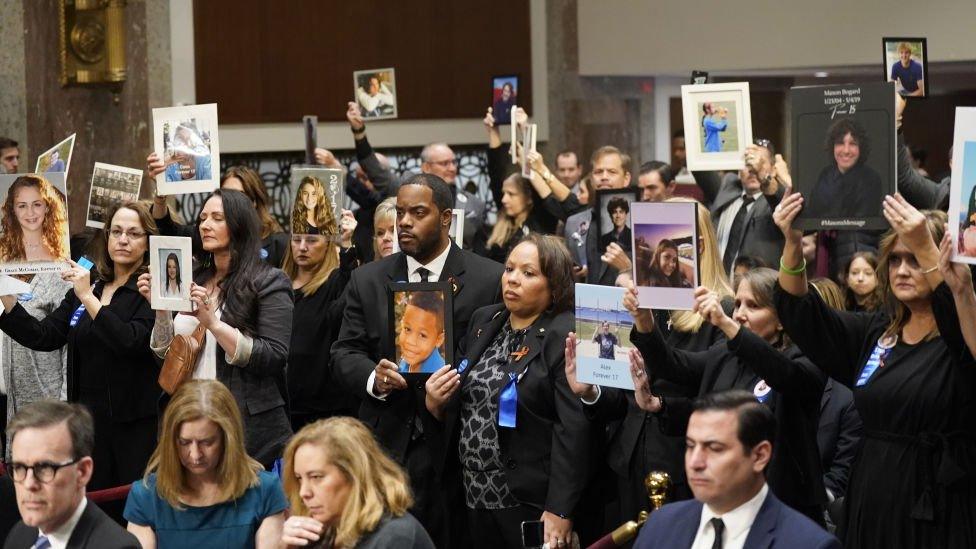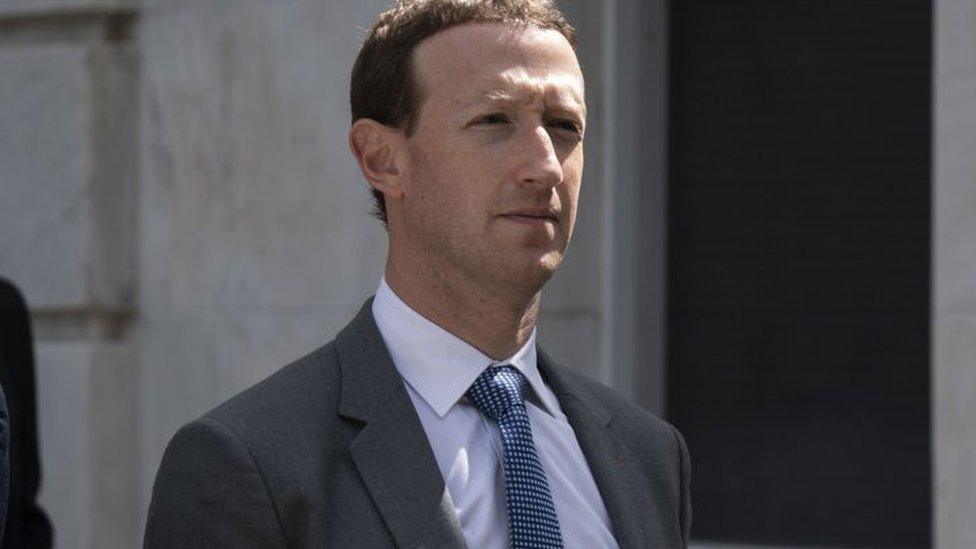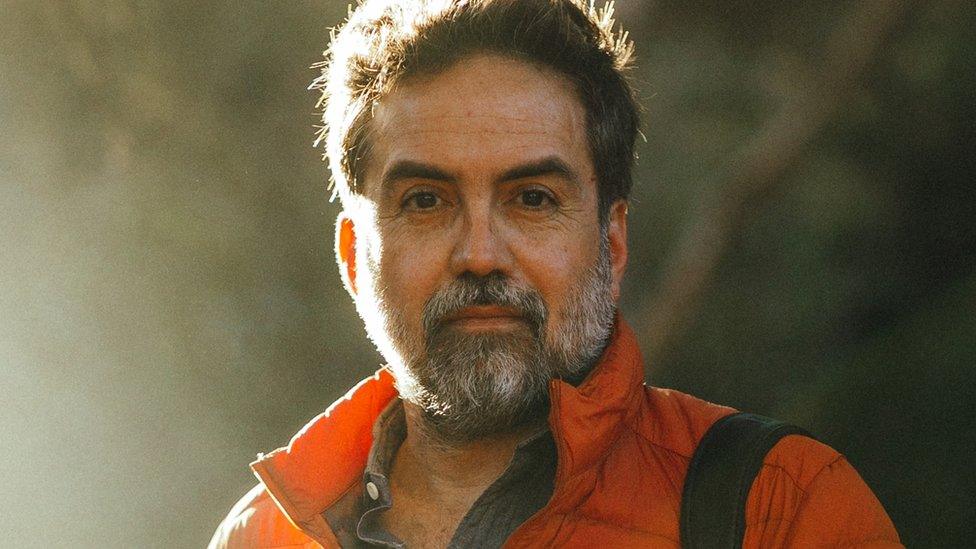Meta boss Mark Zuckerberg apologises to families in fiery US Senate hearing
- Published
Watch: Senators grill tech CEOs on online child exploitation
Meta CEO Mark Zuckerberg has apologised to families who say their children had been harmed by social media, during a fiery hearing in the US Senate.
Mr Zuckerberg - who runs Instagram and Facebook - turned to them and said "no-one should go through" what they had.
He and the bosses of TikTok, Snap, X and Discord were questioned for almost four hours by senators from both parties.
Lawmakers wanted to know what they are doing to protect children online.
Legislation is currently going through Congress which aims to hold social media companies to account for material posted on their platforms.
Wednesday's hearing was a rare opportunity for the US senators to question tech bosses.
Mr Zuckerberg and TikTok CEO Shou Zi Chew voluntarily agreed to testify - but the heads of Snap, X (formerly Twitter) and messaging platform Discord initially refused and were sent government-issued subpoenas.
Behind the five tech bosses sat families who said their children had self-harmed or killed themselves as a result of social media content.
They made their feelings known throughout, hissing when the CEOs entered and applauding when lawmakers asked tough questions.
While the hearing mostly focused on the protection of children from online sexual exploitation, the questions varied widely as the senators took advantage of having five powerful executives there under oath.
TikTok - which is owned by Chinese company ByteDance - CEO Mr Chew was asked whether his company shared US users' data with the Chinese government, which he denied.
US Senator Tom Cotton asked Mr Chew, who is from Singapore, if he had ever belonged to the Chinese Communist Party.
"Senator, I'm Singaporean. No," Mr Chew replied.
Mr Cotton then asked, "Have you ever been associated or affiliated with Chinese Communist Party?"
Mr Chew responded: "No, senator. Again, I'm Singaporean."
He added that as a father of three young children he knew the issues under discussion were "horrific and the nightmare of every parent".
He admitted his own children did not use TikTok because of the rules in Singapore which bar under-13s from creating accounts.
TikTok boss grilled on CCP ties: ‘I am Singaporean’
But it was Mr Zuckerberg, chief executive of Meta, who came under the most scrutiny, as he testified before Congress for an eighth time.
At one point, Republican Senator Ted Cruz asked, "Mr Zuckerberg, what the hell were you thinking?" when he showed the tech boss an Instagram prompt that warns users they may be about to see child sexual abuse material, but asks if they would like to "see the results anyway".
Mr Zuckerberg said the "basic science behind that" is "it's often helpful to, rather than just blocking it, to help direct them towards something that could be helpful". He also promised to "personally look into it".
During another exchange with Republican Senator Josh Hawley, Mr Zuckerberg was invited to apologise to the families sitting behind him.
He stood up, turned to the audience and said: "I'm sorry for everything you've all gone through, it's terrible.
"No-one should have to go through the things that your families have suffered."
Senators frustrated at lack of progress
At the heart of the hearing was the companies' attitudes to the online safety legislation currently going through Congress.
This was summed up in a tense exchange between Jason Citron of Discord and Republican lawmaker Lindsey Graham.
Mr Graham listed a number of bills going through Congress related to online safety, asking if Mr Citron supported them or not.
While Mr Graham gave Mr Citron little opportunity to respond, the Discord boss appeared to have reservations about most of them.
Mr Graham concluded: "So here you are - if you're waiting on these guys to solve the problem, we're gonna die waiting."
Ahead of the hearing, Meta had announced new safety measures, including that minors will now, by default, be unable to receive messages on Instagram and Messenger from strangers.
Watch: Zuckerberg apologises to victims of online exploitation
Social media industry analyst Matt Navarra told the BBC he thought the hearing resembled many similar showdowns, with "lots of US political grandstanding" and a perfect photo opportunity provided by Mr Zuckerberg's apology.
He added that despite senators agreeing on the need for bipartisan legislation to regulate platforms, the question of what happens next remained unclear.
"We've seen these hearings time and time again and they have often, so far, led still to not actually generate any significant or substantial regulation," he said.
"We're in 2024 and US has virtually no regulation, as was pointed out during the hearings, with regards to the social media companies."
The bosses also revealed how many people they employed to moderate content on their platforms.
Meta and TikTok, with the largest user numbers of the platforms represented, said they had 40,000 moderators each, while Snap said it had 2,300, X had 2,000 and Discord - who said it was smaller - had "hundreds" of moderators.
Discord is a messaging platform and has previously been questioned over how it detects and prevents child abuse across its platform.
After the hearing, some of the parents who were in the room staged a rally outside, with several calling on lawmakers to urgently pass legislation to hold firms accountable.
"Just like I did, many parents continue to think that these harms that we're talking about today won't affect their families," said Joann Bogard, whose son Mason died in May 2019. She said he had taken part in a TikTok choking trend.
"These harms are happening overnight to our average kids," she said. "We have the testimonies. Now is the time for our legislators to pass the Kids Online Safety Act".
Arturo Béjar, a former senior staff member who testified to Congress in November 2023, was also there, and told the BBC: "Meta is trying to push their responsibility to provide a safe environment for teens to parents, yet won't add a button where a teen can tell them they've experienced an unwanted advance."
"How can they make it safe for teens without that?"
During today's hearing, Meta said it had brought in "over 30 tools" to support a safe environment for teens online.

Families held up photos of their loved ones in the audience
- Published31 January 2024

- Published7 November 2023
